Clifford Garstang's Blog, page 12
March 22, 2023
I’ve Got Questions for Karla Huebner
Editor’s Note: This exchange is part of a series of brief interviews with emerging writers of recent or forthcoming books. If you enjoyed it, please visit other interviews in the I’ve Got Questions feature.
 Too Early to Know Who’s Winning by Karla HuebnerWhat’s the title of your book? Fiction? Nonfiction? Poetry? Who is the publisher and what’s the publication date?
Too Early to Know Who’s Winning by Karla HuebnerWhat’s the title of your book? Fiction? Nonfiction? Poetry? Who is the publisher and what’s the publication date?The title is Too Early to Know Who’s Winning, and it’s a novel published by Black Rose Writing, launching 23 March 2023.In a couple of sentences, what’s the book about?
This is a tale of liberal women nearing retirement during the Trump presidency. The protagonist, Jacobine Flaa, is a professor of immigration history, and she finds that not only is she barraged by daily strange and upsetting world news (political, ecological, public safety), but her personal life is now filled with health concerns, the deaths of friends and relatives, and questions of how to handle an increasingly tricky friendship.What’s the book’s genre (for fiction and nonfiction) or primary style (for poetry)?
It’s literary fiction and since it’s about women’s lives, it can also be considered women’s fiction.What’s the nicest thing anyone has said about the book so far?
It’s getting some expressions of delight, which is a pleasant surprise when so much of the novel’s subject matter is grim. According to debut novelist Kathy Anderson, “One of the many pleasures of this novel lies in its razor-sharp and very funny observations of contemporary life—Midwestern marriages, Amish chickens, museum docent rebellions, the plethora of festival weekends, medicated students—to name a few.” Similarly, author Peter De Lissovoy says “I as a male reader who enjoyed the wry turns of Cinda’s, Kerry’s, and Jacobine’s existences recommend this novel to other male readers who enjoy a dry wit, and I am certain that female readers will find it a hoot.”What book or books is yours comparable to or a cross between? [Is your book like Moby Dick or maybe it’s more like Frankenstein meets Peter Pan?]
Rachel Cusk’s Transit and Christine Smallwood’s The Life of the Mind are two that come to mind.Why this book? Why now?
We’re no longer in the midst of the Trump presidency, but the possibility of a Trump encore looms, as does climate crisis. Besides, most of us have a friend or two about whom we care but who sometimes drives us a little batty.Other than writing this book, what’s the best job you’ve ever had?
I must confess that this book was not the best job I’ve ever had—it was more of a purgative experience. That means that writing my other books and novel manuscripts constitute the best job I’ve had!What do you want readers to take away from the book?
I hope that readers will be reminded that while there’s much that’s troubling out there, each of us can take action to make the world a better place, and that hope, patience, and a sense of humor are key as we get older.What food and/or music do you associate with the book?
Jacobine lives in the Midwest and occasionally attends events at the local German club, so German-American food such as schnitzels and red cabbage play a role in the story. That means the sound of an oompah band. Jacobine and her friend Cinda also go to some weekend festivals that offer bluegrass and medieval hurdy-gurdy.What book(s) are you reading currently?
The TBR stack looms. I just began Delphic Oracle, U.S.A., by fellow Regal House author Steven Mayfield, and As Far as You Can Go Before You Have to Come Back, by fellow Black Rose author Alle C. Hall. There’s more, of course. Too much more!
 Karla Huebner
Karla HuebnerLearn more about Karla on her website.
Follow her on Twitter and Instagram.
Buy the book from the publisher or on Bookshop.org
March 13, 2023
I’ve Got Questions for Marjorie Hudson
Editor’s Note: This exchange is part of a series of brief interviews with emerging writers of recent or forthcoming books. If you enjoyed it, please visit other interviews in the I’ve Got Questions feature.
 Indigo Field by Marjorie HudsonWhat’s the title of your book? Fiction? Nonfiction? Poetry? Who is the publisher and what’s the publication date?
Indigo Field by Marjorie HudsonWhat’s the title of your book? Fiction? Nonfiction? Poetry? Who is the publisher and what’s the publication date?Indigo Field, Novel, Regal House Publishing, Pub Date: 3/14/2023
In a couple of sentences, what’s the book about?Indigo Field is about the hidden history of the South, buried in an old field, rising to confront present-day characters. It’s about an elderly Black woman who knows it all but will not tell; it’s about how in our culture we believe only the history that is written down; it’s about people, Black and white, who must find their courage and need each other to survive.
What’s the book’s genre (for fiction and nonfiction) or primary style (for poetry)?Indigo Field is often listed as general or literary fiction, but it has elements of magical realism, generational saga, and historical fiction, as well as a pretty big nod to murder mystery and cli-fi. Some have called it a social justice novel, as it looks closely at questions about the court system, generational racial violence, and the possibility of restoring balance and justice.
What’s the nicest thing anyone has said about the book so far?Peter Mock, the buyer at McIntyre’s Books – he’s a hard-boiled mystery reader so he just about made me cry with this. In fact, I tear up every time:“What an incredible story of the past and present colliding, revealing scars upon the land that can’t be healed until the pain is confronted and atoned for. Told with such superb skill, and a prose style that left me weeping, Marjorie has crafted a novel that will resonate with the reader long after the last page is turned.”
What book or books is yours comparable to or a cross between?The Good Neighborhood, by Therese Fowler (Black and white neighbors feud) meets A Hell of a Book by Jason Mott (the spirit of a murdered child has conversations out loud with the main character) meets The Kite Runner by Khaled Hosseini (nothing about Afghanistan, but a grown man needs to find a way to atone for his past).
Why this book? Why now?I’ve been bothered about the issues raised in this novel for a long time, and it took me a long time to figure out a structure that was clear-eyed about different kinds of characters and their particular way of creating barriers against “the other.” While I was revising over a 30-year period I wondered if anyone would understand what I was talking about – the pervasive unspoken crimes against Black and Indigenous people in the South, the pervasive turning away from acknowledgment of that. So – why now? – I guess by now it’s clear to most people that this is a problem for white people too.
Other than writing this book, what’s the best job you’ve ever had?It’s hard to pick, but here are some favorites: Music manager, Food for Thought Restaurant in DC – I got to audition and promote new singer-songwriters. Features Editor, National Parks magazine – I got to meet some extraordinary environmental warriors and traveled to Germany for a wilderness conference. Copyeditor, Algonquin Books of Chapel Hill – I got to read great books and get paid for it!
What do you want readers to take away from the book?I want readers to love my characters as much as I do, and I hope they look at the world around them a new way – with more empathy and heartbreak and hope.
What food and/or music do you associate with the book?Strawberry shortcake with farmers market strawberries; white liquor in Mason jars; goat cheese; Nabs crackers; Cheerwine in cans. A blend of old-time mountain music and spirituals. In fact, I’m working up a show with some musician friends: nine scenes, nine songs, with Bill Payne, Bobby Doolittle, and Nancy McCurry in Greensboro, NC. Watch for news!
What book(s) are you reading currently?Tell Me One Thing by Kerri Schlottman. The Sound of Rabbits by Janice Deal. Alone with All that Could Happen: On Writing Fiction by David Jauss.
 Marjorie Hudson
Marjorie HudsonLearn more about Marjorie on her website.
Follow her on Facebook, Instagram, Twitter, and LinkedIn.
Buy the book from the publisher (Regal House Publishing), McIntyre’s Books, or Bookshop.org.
March 7, 2023
March Madness: Story Collection Bundle
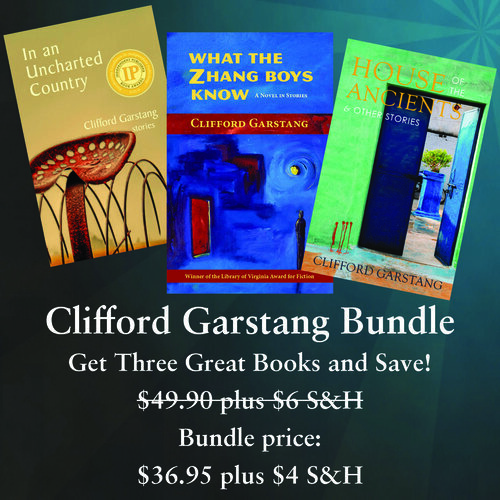
Press 53 is the publisher of all three of my short story collections: In an Uncharted Country, What the Zhang Boys Know, and House of the Ancients and Other Stories.
For a limited time, Press 53 is offering all three collections in a bundle for a special discounted price. I love the short story form and really enjoyed writing these books published over an 11-year period, from 2009 to 2020.
Order the three-book bundle from Press 53, just $36.95 plus $4 S&H in the US.
March 1, 2023
2023 Reading — February
Short month, short list of completed books:
 Dog on Fire by Terese Svoboda
Dog on Fire by Terese SvobodaDog on Fire by Terese Svoboda is a novel I reviewed for Southern Review of Books. (My review will appear on March 8.) In a choppy but lyrical style, the author tells her story in alternating points of view. The primary voice belongs to a middle-aged woman who has returned to her parents’ home on the great plains after the end of her marriage. The secondary voice belongs to a woman who was connected to the first woman’s deceased brother. The thrust of the book is the primary narrator’s efforts to learn how her brother died. The mystery itself doesn’t really seem to matter much, but the journey of discovery is revealing. Along the way, we witness the coldness of both women’s parents and the consequences of abuse. The primary narrator was abused by her husband. The secondary narrator was abused by her father and some local boys. The two women are in conflict for most of the tale, despite their shared memories that at times seem to bring the dead man to life.
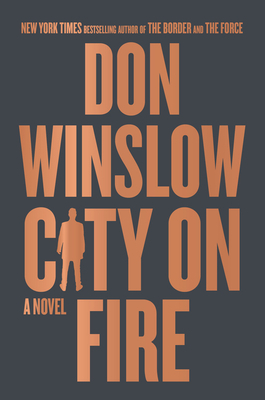 City on Fire by Don Winslow
City on Fire by Don WinslowCity on Fire by Don Winslow is about a clash between the Italian and Irish mobs that control much of Providence, Rhode Island in the 1980s. (The book is apparently the first volume in a series featuring its protagonist, so one assumes from the outset that he’s not going to be killed.) The central character, Danny Ryan, is the son of the former Irish mob boss who was unseated because of his problems with booze. Now the mob, which controls the docks and the union, is run by John Murphy and his sons, while Danny is married to one of John’s daughters. Because of some boneheaded moves by the youngest Murphy son, the two mobs are pushed to the brink of war. Complications include an FBI agent looking to get a rat to help bust everyone, Danny’s long-lost mother’s reappearance, and a temporary alliance with a black gang that wants to control the drug trade. It’s probably a good example of the crime/thriller genre, which is definitely not my usual fare, and it has plenty of gratuitous sex and violence, but it made for an entertaining audiobook in the car.
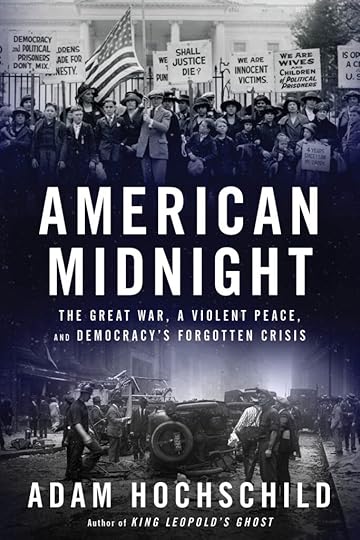 American Midnight by Adam Hochschild
American Midnight by Adam HochschildAmerican Midnight: The Great War, a Violent Peace, and Democracy’s Forgotten Crisis by Adam Hochschild was my book club’s selection for February, and an informative book it was, too. I think many of us know the broad outlines of America’s entry into the Great War (WW I), and maybe something about Woodrow Wilson and the League of Nations. (Because my town is the birthplace of Wilson, and there’s a museum here dedicated to him, maybe we are a little more aware of him than folks are elsewhere.) The research behind this book is amazing, and the whole point of the project (discounting the unresolved question of whether or not it was a good idea to join the war against Germany) is to reveal the extent of the unconstitutional repression that occurred before, during, and after the war. Xenophobia was rampant, anti-union sentiment was high, as was anti-socialism, and of course racism was everywhere, from the President on down. Excellent book, if you don’t mind its bias.
 Even the Dog Knows by Jason Wright
Even the Dog Knows by Jason WrightEven the Dog Knows by Jason Wright is a novel I read because I am moderating a conversation with the author in March as part of the Virginia Festival of the Book (actually a “preview event” as it takes place the week prior to the Festival and is happening here in Staunton instead of Charlottesville, where regular Festival events happen). It’s a good location because the book is set in—or at least it begins in—Woodstock, Virginia, which is just 65 miles north of Staunton in the Shenandoah Valley. The author is known for his uplifting, heart-warming novels, and this one is no exception. Don’t look for brilliant language or deep characters here, but it does have its charms, largely in the character of the dog, Moses, who is mostly, but not entirely, aware of what is going on around him. The story is about the marriage of Gary and Meg who separate after 39 years of marriage, for reasons that are a puzzle to Gary. Gary has custody of Moses, who misses Meg. In a secondary plot, Gary and Meg’s grandson Troy—whom they raised as their own child after the death of their daughter—returns to Woodstock after a short minor-league baseball career. For a variety of reasons, Gary, Troy, and Moses are headed south to the Florida panhandle to see Meg in her retirement community near Pensacola. Obstacles arise, but you can guess where the story is headed.
February 20, 2023
I’ve Got Questions for Joanna Higgins
Editor’s Note: This exchange is part of a series of brief interviews with emerging writers of recent or forthcoming books. If you enjoyed it, please visit other interviews in the I’ve Got Questions feature.
 In the Fall They Leave by Joanna HigginsWhat’s the title of your book? Fiction? Nonfiction? Poetry? Who is the publisher and what’s the publication date?
In the Fall They Leave by Joanna HigginsWhat’s the title of your book? Fiction? Nonfiction? Poetry? Who is the publisher and what’s the publication date?The Title is In the Fall They Leave; it’s fiction, and the publisher is Regal House Publishing. The novel is due out on Feb. 21, 2023.
In a couple of sentences, what’s the book about?Inspired by the resistance efforts of the British nurse Edith Cavell in German-occupied Brussels during WWI, In the Fall They Leave tells the story from the perspective of a fictional student nurse, conscientious and fearful of failure, who finds herself in a dangerous predicament when Germany invades and occupies Belgium: Either obey the occupiers’ newly imposed laws, which demand disloyalty to her matron but will secure her own future, or break those laws and risk death by firing squad for treason. In the Fall They Leave has to do with love, friendship, betrayal, art—but perhaps above all, moral courage as an agent of change.
What’s the book’s genre (for fiction and nonfiction) or primary style (for poetry)?Literary fiction/Historical fiction
What’s the nicest thing anyone has said about the book so far?The nicest thing anyone has said, so far, about In the Fall They Leave is hard to repeat without sounding like some raging egomaniac. But, well, it is the nicest thing and, given that I probably won’t be hearing anything like that again, here goes: That among her “prized works,“ someone has said, “this may well be her masterpiece.” Yikes. Yet you have to admit, those words are pretty nice.
What book or books is yours comparable to or a cross between? [Is your book like Moby Dick or maybe it’s more like Frankenstein meets Peter Pan?]There’s a biographic novel titled Fateful Decision: Edith Cavell, WWI Nurse. My novel, however, tells the story from the perspective of a fictional student nurse and leans more heavily on the imagination. Possibly another comparison might be to Daniel Mason’s The Winter Soldier because that novel also has to do with a novice in fraught circumstances. In The Winter Soldier the main character is a third-year medical student.
Why this book? Why now?In the Fall They Leave is my sixth work of fiction, and I now know that I don’t pick what to write about; the idea more or less chooses me. Something read or seen or overheard creates a compulsion to explore, imaginatively, the intuited drama. Then, the idea owns me, and I’m just the servant of the thing, trying to find the right form for it. Which means lots of rewriting over, often, a period of years.
As for the second question, Why now? I have to say that timing isn’t a factor for me. Something wants to get written, and in a kind of duck-duck-goose game of the muses, I sense a metaphoric tap and just start “musing,” then writing. Or, if necessary, first, begin the researching and note-taking. It’s an instinctive rather than calculated thing.
Other than writing this book, what’s the best job you’ve ever had?The best job I ever had was teaching literature courses to a small class of adults at the University of Hawai’i—West Oahu College. They were fantastic–so excited about the readings, so eager to throw their thoughts and questions out there. Each class a joy.
What do you want readers to take away from the book?I’d love for readers to be moved by the book. Experience the deep emotions that connect us as humans regardless of place or time setting. I hope that a reader will feel that reading the novel was time well spent and will close the book with a sense of having gone through something soul-touching and timeless.
What food and/or music do you associate with the book?Chopin’s Nocturne op. 9, no 2. It has a significant part in the book. I won’t spoil it by explaining!
Food: Streusel, cinnamon rolls, sugar cookies.
What book(s) are you reading currently?I’m actually reading your first novel, Cliff, The Shaman of Turtle Valley, and enjoying it very much.
Next, it’ll be works by my fellow Regal House Frontlist authors, Mimi Herman, Kerri Schlottman, Lisa Cupolo, Marjorie Hudson, Susan Reinhardt, Ona Gritz, Sunu Chandry, Kimberly Behre Kenna, M.M. Downing, and S.J. Waugh. I know I’m in for a treat—and can’t wait.
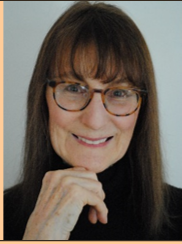 Joanna Higgins
Joanna HigginsLearn more about Joanna on her website.
Follow her on Facebook.
Buy the book from the publisher (Regal House Publishing), Amazon, or Bookshop.org.
February 13, 2023
I’ve Got Questions for Ona Gritz
Editor’s Note: This exchange is part of a series of brief interviews with emerging writers of recent or forthcoming books. If you enjoyed it, please visit other interviews in the I’ve Got Questions feature.
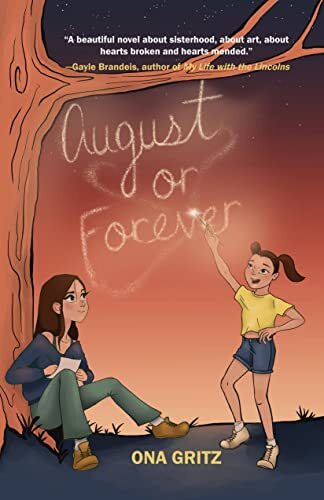 August or Forever by Ona GritzWhat’s the title of your book? Fiction? Nonfiction? Poetry? Who is the publisher and what’s the publication date?
August or Forever by Ona GritzWhat’s the title of your book? Fiction? Nonfiction? Poetry? Who is the publisher and what’s the publication date?August Or Forever, middle-grade fiction, Regal House Publishing/Fitzroy Books, February 14, 2023.
In a couple of sentences, what’s the book about?August Or Forever is the story of ten-year-old Molly and how a long-awaited visit from her beloved half-sister challenges her ideas of what makes a family a family.
What’s the book’s genre (for fiction and nonfiction) or primary style (for poetry)?Realistic literary fiction.
What’s the nicest thing anyone has said about the book so far?It’s hard to choose. So many people have had kind words for this book. The folks at the Reader’s Choice Book Awards called it “a charming and beautifully written book for young readers.” I’ll go with that since they also gave August Or Forever five stars and dressed it up with a nice medal, naming it a finalist for an upcoming award.
What book or books is yours comparable to or a cross between? [Is your book like Moby Dick or maybe it’s more like Frankenstein meets Peter Pan?]Patricia MacLachlan’s Sarah, Plain and Tall was very much with me when I first conceived of this book. In my own way, I aimed to capture something of its simple beauty and the palpable longing that drives the story.
Recently, in a conversation on The Growing Readers Podcast, Bianca Schulze said my book brought to mind Katherine Paterson’s Bridge to Terabithia. Well, that did my heart good! Years ago, I read an essay by Katherine Paterson where she said that while a novel for adults is like a symphony orchestra, “…when I read my own Bridge to Terabithia, I hear a flute solo unaccompanied.” I never forgot that. The beautiful notion that adult fiction, with its many twists, layers, and returning themes, was comparable to a full concerto, but a book for children was this: spare, singularly focused, quietly beautiful, and brave.
Why this book? Why now?With all the children’s novels that portray blended families, I’ve yet to find one that, like mine, offers the perspective of a child born after the drama of divorce into a parent’s happier second marriage. My narrator Molly loves her older half-sister, but she doesn’t really have her in the day-to-day sense that siblings who live together have each other. She was essentially born into a kind of loneliness that I’m sure many children feel. It seemed time for someone to explore that experience on the page, and having lived through something similar, I thought I might just be the writer to do it.
Other than writing this book, what’s the best job you’ve ever had?The best job I’ve ever had was and is being my son’s mother. While I was raising him, I was also a children’s and young adult librarian at our local library. What a great combination that was. He and I loved sharing books together. We read piles of picture books every night, then moved on to chapter books, and even young adult novels since we kept up the ritual all the way through his middle school years. What kept me afloat once he’d outgrown being read to was that I got to lead storytimes at work, and that children’s and young adult literature stayed central to my life long after he’d moved on to adult books, podcasts, and other things.
What do you want readers to take away from the book?That they have a friend in Molly. That families come in all kinds of shapes and configurations, and that deep friendships can be familial. That if their natural state is, in part, loneliness and longing, they are not alone in this.
What food and/or music do you associate with the book?Molly’s favorite food is lasagna. Her sister Alison’s is chocolate. They get those favorites from me.
As for music, a flute solo (see Question 5.)
What book(s) are you reading currently?On my own, I’m reading Smile, a memoir by Sarah Ruhl. Together with my husband, I’m reading Molly Fisk’s new collection of essays, Everything But the Kitchen Skunk. I’m also reading books in a series of hi-lo young adult novels-in-verse put out by West 44 Books because I’m working on one of my own for them now. Among my favorites so far are Every Little Bad Idea by Caitie McKay and Listen Up by Sandi Van.
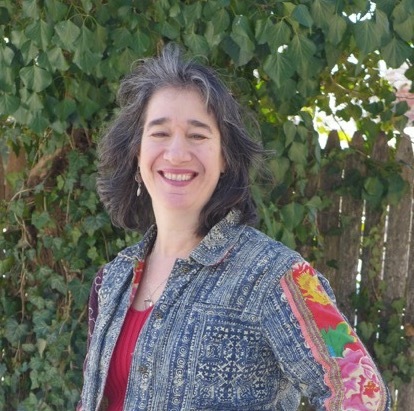 Ona Gritz
Ona GritzLearn more about Ona on her website.
Follow her on Amazon.
Buy the book from the publisher (Regal House/Fitzroy Books), Children’s Book World, or Bookshop.org.
February 2, 2023
I’ve Got Questions for Kimberly Behre Kenna
Editor’s Note: This exchange is part of a series of brief interviews with emerging writers of recent or forthcoming books. If you enjoyed it, please visit other interviews in the I’ve Got Questions feature.
 Artemis Sparkle and the Sound Seekers Brigade by Kimberly Behre KennaWhat’s the title of your book? Fiction? Nonfiction? Poetry? Who is the publisher and what’s the publication date?
Artemis Sparkle and the Sound Seekers Brigade by Kimberly Behre KennaWhat’s the title of your book? Fiction? Nonfiction? Poetry? Who is the publisher and what’s the publication date?Artemis Sparke and the Sound Seekers Brigade, Middle-grade Fiction, Regal House/Fitzroy Books 2/2/23
In a couple of sentences, what’s the book about?When twelve-year-old Artemis Sparke investigates why the salt marsh, her beloved sanctuary, is dying, she discovers that the historic hotel where she lives with her mom may be part of the problem. But speaking up would mean confronting the cranky hotel owner who happens to be her mom’s boyfriend and boss. Artemis conjures up help from deceased ecologists, and as she works to untangle their clues, she finds family secrets that could be the key to saving the salt marsh but may destroy life as she knows it.
What’s the book’s genre (for fiction and nonfiction) or primary style (for poetry)?Middle-grade fiction with a dash of magical realism
What’s the nicest thing anyone has said about the book so far?I’ve gotten a lot of great feedback on my book. Here’s one quote:
It’s unusual to find a middle-grade read that deftly navigates both peer relationships and the politics of adult interactions, but Artemis Sparke and the Sound Seekers Brigade addresses both worlds as it evolves a mystery’s clues and the ramifications of a discovery that could save one facet of Artemis’s life but rock her world in too many other ways. The dilemma is well-done and will appeal to young readers, while the lively ecological and social threads that run through the mystery offer many thought-provoking moments. ~D. Donovan, Senior Reviewer, Midwest Book Review
What book or books is yours comparable to or a cross between? [Is your book like Moby Dick or maybe it’s more like Frankenstein meets Peter Pan?]With its strong nature settings that inspire a brave heroine, my book is similar in feel to Loren Wolk’s books, Echo Mountain and Wolf Hollow.
Why this book? Why now?In a world that often feels dizzy and disconnected, we need books that feature brave girls who discover and embrace their right to be seen, heard, and accepted just as they are. With this knowledge comes their power and their responsibility to respect other people, to honor nature, and to inspire those around them to do the same. Books like mine that explore both childhood’s light and dark places can provide hope and also encourage kids to bring a bit of love and kindness into our world.
Other than writing this book, what’s the best job you’ve ever had?Teaching fifth grade was my favorite job, and my time spent learning from my students continues to inspire my fiction writing.
What do you want readers to take away from the book?I hope readers come to understand that we are each a part of something bigger than ourselves, that everything is connected in our environment — people, plants, animals—and each seemingly small action makes a difference not only for the individual but for the whole. Even kids have power.
What food and/or music do you associate with the book?Oh, yum! The book’s shoreline settings abound with typical New England staples such as clam chowder, fish and chips, and lobster rolls, all enjoyed, of course, picnic-style on the beach.
What book(s) are you reading currently?So excited to start Barbara Kingsolver’s Demon Copperhead. On the kid-lit side, I’m reading a middle-grade book, The Second Chance of Benjamin Waterfalls by James Bird, whose ability to create multifaceted characters and a plot that engages and evokes discussion is beyond amazing.
 Kimberly Behre Kenna
Kimberly Behre KennaLearn more about Kimberly on her website.
Follow her on Twitter, Instagram, and Facebook
Buy the book from the publisher (Regal House/Fitzroy Books) or Bookshop.org.
February 1, 2023
2023 Reading — January
I only managed to finish three books this month, but they were long ones!
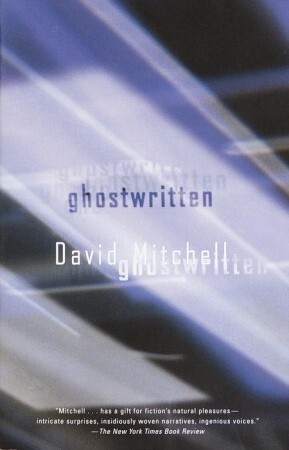 Ghostwritten by David Mitchell
Ghostwritten by David MitchellGhostwritten was David Mitchell’s first novel. The only other book of his I’ve read is Cloud Atlas, which famously is a cycle of stories that circles in on itself. This book also is telling separate stories that have links, and part of the enjoyment of reading, in addition to the great writing, is catching those links. It’s harder to see thematic links, however, although the title of the book gives a clue. Who, the book might be asking, is writing the narrative behind the scenes? The first and last chapters, for example, are about a Japanese man who goes by the name Quasar. He is a member of a cult intent on cleansing mankind before the arrival of a comet that will destroy the world. He takes his instructions from a leader, Serendipity, someone he does not see. There is also a non-corporeal being—or more than one—who appears in a couple of the chapters, and in a chapter set in Hong Kong, there may be an actual ghost who inhabits the main character’s apartment. Artificial intelligence appears in the New York chapter, something apparently scripted by the physicist whom we meet in the Ireland chapter. Gangsters feature in the Hong Kong, Mongolia, and St. Petersburg chapters, vile men who determine the narrative, even though they are little seen. And so on. Even though I can’t say I fully understand what Mitchell is doing in the book, I thoroughly enjoyed reading it.
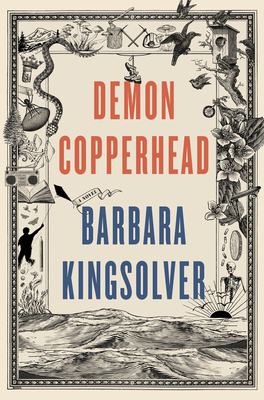 Demon Copperhead by Barbara Kingsolver
Demon Copperhead by Barbara KingsolverDemon Copperhead by Barbara Kingsolver is her latest novel and was my book club’s selection for January. The narrator and main character is Damon, a kid born in far western Virginia to a young single mother who struggles with addiction. He’s ten when the story starts, living alone with his mother in a trailer, and shortly after that he enters the foster care system. After his latest foster family leaves town, Damon goes off in search of his dead father’s mother, who lives somewhere in East Tennessee. At that point, Damon, called Demon by most, begins to grow his awareness of the raw deal faced by many in Appalachia, and the book paints a stark portrait of poverty, drug addiction, a lousy and over-burdened foster-care system, while laying the blame for the area’s woes on corporate greed: first the coal mines and then the pharmaceutical companies. As with other Kingsolver novels, it’s hard to miss her agenda, and if it happens to be one you share (I do), then the book is immensely satisfying.
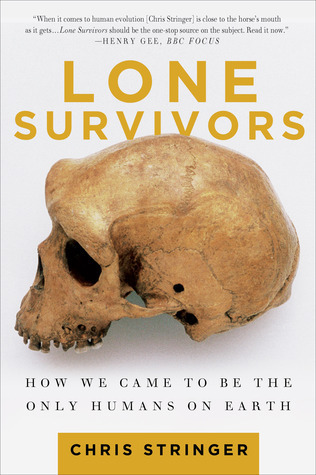 Lone Survivors by Chris Stringer
Lone Survivors by Chris StringerLone Survivors: How We Came to be the Only Humans on Earth by Chris Stringer is a complex attempt by a paleoanthropologist to explain some aspects of human evolution. I found it fascinating, if somewhat confusing. Stringer is an advocate for Recent African Origin (RAO), the theory that modern humans originated in Africa and spread from there to other parts of the globe. There are variations of the theory that posit multiple waves of this exodus, which I think is the explanation for pre-modern humans such as Neanderthals and others whose fossilized skeletons have been found in Europe and elsewhere. The book is already a little dated, I think, as the technology is moving very fast that allows the dating of discoveries. I was particularly interested in the origins of language, and this book touches on that very briefly. On the whole, the time frames we’re talking about are mind-boggling.
I’ve Got Questions for Molly Fisk
Editor’s Note: This exchange is part of a series of brief interviews with emerging writers of recent or forthcoming books. If you enjoyed it, please visit other interviews in the I’ve Got Questions feature.
 Everything but the Kitchen Skunk by Molly FiskWhat’s the title of your book? Fiction? Nonfiction? Poetry? Who is the publisher and what’s the publication date?
Everything but the Kitchen Skunk by Molly FiskWhat’s the title of your book? Fiction? Nonfiction? Poetry? Who is the publisher and what’s the publication date?Everything But the Kitchen Skunk: Observations from a Working Poet is nonfiction and was published in December 2022 by Story Street Press, an imprint I manage myself. It is my fifth compilation of radio commentary, each one containing 50 brief essays that have aired on community station KVMR-FM, 89.5, Nevada City, CA. (You can listen to new ones at the close of the News Hour every Thursday night at 6:25-ish p.m. Pacific time: kvmr.org/streaming, if you’d like.)
In a couple of sentences, what’s the book about?So many things! My perspective as a poet on love, death, grammar, lingerie, small towns, and the natural world, including skunks, and including poetry. There’s also a bit about open-water swimming.
What’s the book’s genre (for fiction and nonfiction) or primary style (for poetry)?The genre is personal essay, but it’s a little unusual because the essays were originally written for the radio and therefore had to be easy to pronounce and each had a strict three-minute time limit. Plus, I couldn’t swear. I was offered this weekly radio gig 17 years ago because I was a poet and co-hosted a show about books and writers for the station. I had not written an essay before (except for college), but the short form turned out to be similar to poetry, so it was easy to learn. I never imagined that I would do it for so long.
What’s the nicest thing anyone has said about the book so far?“Your voice is crisp and decided yet relaxed and just close enough, somehow—and the pieces all are impeccably shaped and written.” John Updike
I have to admit to having had a famous uncle. Uncle John did not help my career in any way except to be witty at the dinner table as I was growing up, which I’m sure rubbed off without either of us knowing it. But before he died, he wrote me a letter including this quote about my first essay book, and when I asked, said it would be fine to use it as a blurb: “You might as well get some good out of me! What are uncles for?” I’m afraid it’s ridiculous, but he had never praised me before and it was such a nice thing to say that I use it on the back of every essay book still.
What book or books is yours comparable to or a cross between? [Is your book like Moby Dick or maybe it’s more like Frankenstein meets Peter Pan?]Someone thinks I’m the literary love child of Anne Lamott and David Sedaris. Everything But the Kitchen Skunk is a cross between The Essential Emily Dickinson and Erma Bombeck’s The Grass Is Always Greener Over the Septic Tank.
Why this book? Why now?We humans are having a rough time lately, rougher than usual. After the pandemic restrictions relaxed a bit and I could gather my wits again, I decided to compile another essay book (the most recent one had been in 2018), because people love them, and I think they’re a force for good in the world: for honesty and humor and cheer and light-heartedness based in reality. Everything But the Kitchen Skunk isn’t escapist reading, but it provides relief—while also acknowledging what’s going on in the world and in our lives right now. From the perspective of a rural, white, female, late-middle-aged poet.
Other than writing this book, what’s the best job you’ve ever had?I was a sweater designer before I became a writer and making sweaters with sea horses or pterodactyls on the front instead of reindeer was my favorite job. (I was also a waitress, a bookkeeper, a Fortune 1000 lender, and worked in a ski hotel in Norway.) I should mention that writing poems rather than essays is my real work, for which I have won fancy prizes and been the inaugural Poet Laureate of my county, and nothing compares to that, not even pterodactyls. I came to poetry by accident when I was 35, through pain, after all those other endeavors, and discovered it was my native language. You can look my poems up on Google or my website. I’m also, just to round out the story, a life and writing coach.
What do you want readers to take away from the book?I want readers to laugh, cry, and think. I want them to take away a feeling of having been seen, of feeling comforted, and of being glad to be human. I want them to slow down and look around more carefully because there are surprises, wonders, mysteries, and hilariousness everywhere.
What food and/or music do you associate with the book?Great question. Food would have to be coffee, since I write so much in my favorite coffee shop (12 oz. latte with whole cow’s milk, which we have to specify, living in California). Music I think would be bird song: the gurgling sound of Sand Hill cranes calling when they migrate above my house twice a year between Saskatchewan and California’s Central Valley.
What book(s) are you reading currently?Thinking, Fast and Slow, by Daniel Kahneman (nonfiction)
Frank: Sonnets, by Diane Seuss (poems, and I know I’m late on this one!)
Undress, She Said, by Doug Anderson (poems)
Balladz, by Sharon Olds (poems)
The Hearts of Horses, by Molly Gloss (fiction, and for the third time)
 Molly Fisk
Molly FiskLearn more about Molly on her website.
Follow her on Facebook, Twitter, and Patreon.
Buy the book from the author, Amazon, Powells, or Bookshop.org.
January 31, 2023
I’ve Got Questions for Kerri Schlottman
Editor’s Note: This exchange is part of a series of brief interviews with emerging writers of recent or forthcoming books. If you enjoyed it, please visit other interviews in the I’ve Got Questions feature.
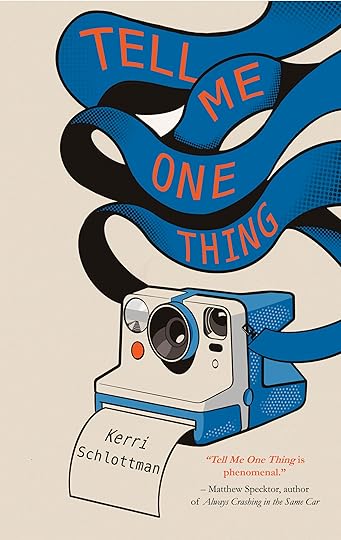 Tell Me One Thing by Kerri SchlottmanWhat’s the title of your book? Fiction? Nonfiction? Poetry? Who is the publisher and what’s the publication date?
Tell Me One Thing by Kerri SchlottmanWhat’s the title of your book? Fiction? Nonfiction? Poetry? Who is the publisher and what’s the publication date?Tell Me One Thing, Fiction, Regal House Publishing, January 31, 2023
In a couple of sentences, what’s the book about?Tell Me One Thing is a portrait of two Americas, examining power, privilege, and the sacrifices one is willing to make to succeed as it tells the story of a provocative photograph, the struggling artist who takes it, and its young and troubled subject. Traveling through the 1980s to the present day, Tell Me One Thing delves into New York City’s free-for-all grittiness while exposing a neglected slice of the rural rust belt.
What’s the book’s genre (for fiction and nonfiction) or primary style (for poetry)?Literary fiction
What’s the nicest thing anyone has said about the book so far?Chelsea Bieker, the author of Godshot and Heartbroke, who is one of my favorite writers, provided an amazing blurb for the back cover and said: “I want everyone to read this book.” That felt like the best compliment the book could get.
What book or books is yours comparable to or a cross between? [Is your book like Moby Dick or maybe it’s more like Frankenstein meets Peter Pan?]Tell Me One Thing is like a mash-up of Rebecca Makkai’s The Great Believers, Julie Buntin’s Marlena, and Molly Prentiss’s Tuesday Nights in 1980. I’ve also been told by early readers it reminds them of the Showtime series Shameless, HBO’s Mare of Easttown (minus the mystery), and Netflix’s Ozark (minus the murders).
Why this book? Why now?Tell Me One Thing looks deeply at inequality and privilege in its many forms, in particular economic inequality which I think is one of the most important and persisting problems we face in this country. Stories have an incredible power to unite people and open up their perspectives. Given how divided the country has become, I hope Tell Me One Thing will shed some light on these big topics that the country continually shies away from, and show that people are just trying to make it day to day. If we could find common ground, we could support each other more in that effort and things would greatly improve for everyone.
Other than writing this book, what’s the best job you’ve ever had?I used to be a massage therapist a long time ago, and I really loved that work. It was so rewarding to connect with people and make them feel better. I heard some amazing and even shocking stories from my clients as well and used to joke about writing a book of Confessions on the Massage Table. It was also kind of fascinating to see all the ways people screwed themselves up – for example, never let kids jump on you and don’t play tackle sports over age thirty. I had to give up massage therapy when I moved to New York City from Michigan in my late twenties because the competition for jobs was so strong and it was expensive to get licensed, but I sometimes think about picking it back up again.
What do you want readers to take away from the book?I hope Tell Me One Thing will encourage people to be more empathetic to others who are different from them. I grew up in a working-class area of Southeast Detroit with a single mom. It was (and still is) a very economically challenged place, and we struggled for many years. When I moved to New York City in 2005, I was stunned by how little people on the East Coast understood where I’d come from. The coastal bubble is very real. It’s been a huge eye-opener for me straddling these two very different settings in my life. I hope my writing helps to fill in the gaps and encourages people in both types of places to understand each other a bit more.
What food and/or music do you associate with the book?Tell Me One Thing spends quite a bit of time in the 1980s and when I was writing it, I listened to a lot of Fleetwood Mac, Blondie, Roxie Music (the title takes its name from their song More Than This), Joan Jett, X-Ray Specs, and the Jam. As for food, the book reminds me of a cheap grilled cheese sandwich, the kind with flimsy Wonder Bread and a single slice of Kraft cheese, but I think that’s because I spent most of the 80s eating that.
What book(s) are you reading currently?I’m currently reading Shiner by Amy Jo Burns, which is a gorgeous novel, and Heartland: A Memoir of Working Hard and Being Broke in the Richest Country on Earth by Sarah Smarsh. Next up are my fellow Regal House authors’ books Kudzo Queen by Mimi Herman and Hemingway Hollow by Culley Holderfield.
 Kerri Schlottman
Kerri SchlottmanLearn more about Kerri on her website.
Follow her on Instagram and Twitter.
Buy the book from the publisher (Regal House Publishing) or Bookshop.org.



